Stress in the cerebellum
Under challenging conditions a signaling molecule is critical for the motor ability
In two recent and related studies, scientists at the Max Planck Institute of Psychiatry in Munich have advanced our understanding of the corticotropin-releasing factor (CRF) system’s role in cerebellar functioning. The cerebellum is a large brain structure known primarily for its role of fine-tuning motor activity.

In the first study, researchers investigated the stress neuropeptide CRF in a region of the brain called the inferior olive. The inferior olive is found in the brain stem and is one of the major inputs to the cerebellum, sending climbing fibers to Purkinje cells. It was known that CRF is highly expressed in inferior olive neurons both in mice and humans. However, no research had looked at the role of these neurons in behavior or physiology.
Using animal experiments with lowered levels of CRF only in the inferior olive neurons, the scientists could investigate its specific role in mice. First author and a former PhD student of the Institute´s director Alon Chen, Gili Ezra-Nevo explains: “We were able to show that CRF in these neurons is critical for the motor ability of the mouse but only under challenging conditions and not for general locomotion.”
Deleted receptor
In the second study, the researchers investigated the CRF type 1 receptor (CRFR1) in the cerebellum. Again, it was known that CRFR1 is highly expressed in the cerebellum, but little was known about its function. In another mouse model, scientists deleted CRFR1 in the granular cells of the cerebellum and explored the behavioral and cellular consequences. They found a profound effect on learning both at the cellular and behavioral levels without any effect on baseline motor skills. The granular cell deletion changed long-term potentiation and the expression of calcium signaling components.
Alon Chen, Director at the Institute and heading these two projects concludes: “These studies highlight the CRF system’s central role in cerebellar functioning. Patients with stress-related pathologies show altered cerebellar connectivity, so understanding how stress can affect motor function and learning is important.”
jk
The scientific results were gained within the framework of a scientific cooperation between the Max Planck Society and the Weizmann Institute in Israel: the “Max Planck – Weizmann Laboratory for Experimental Neuropsychiatry and Behavioral Neurogenetics”. The laboratory was founded in March 2014 with funding from the Max Planck Charitable Foundation in order to support joint research projects of junior scientists at both institutes.












